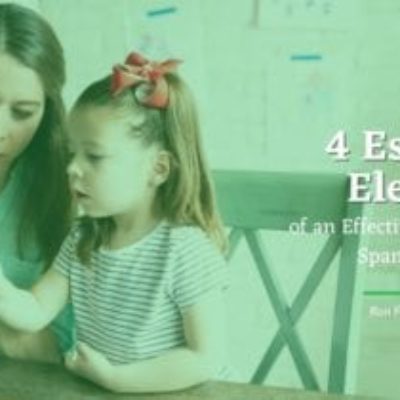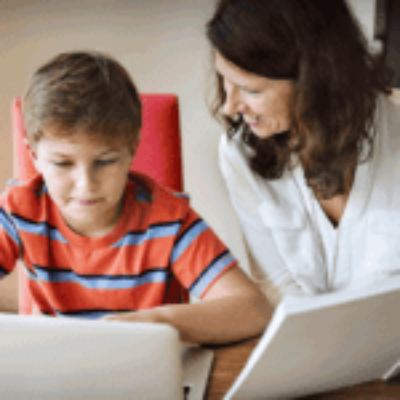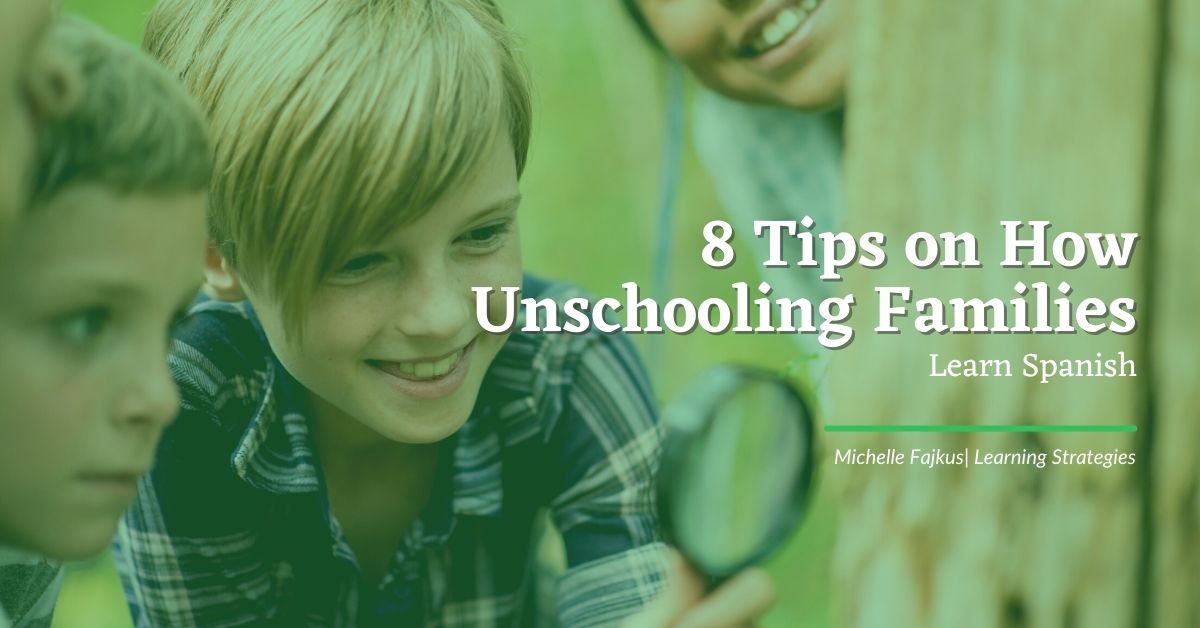
8 Tips on How Unschooling Families Learn Spanish
Unschooling is a philosophy of learning based around the notion that all children are born with endless natural curiosity. According to unschooling, humans learn best in non-coerced, self-directed situations. In other words, unschoolers follow their passions however they can.
The unschooled choose which topics to learn and when—with parental encouragement and without a set curriculum. Learning takes place when the child is engaged and interested in themes, topics, and activities that they choose.
A variation of homeschooling, unschooling looks different for every family because it caters to each family’s unique needs.
Keep reading to discover the basics of unschooling and how to learn Spanish with this progressive educational philosophy in mind.
Are You a Visual Learner? Watch Our Video on This Topic
What is Unschooling?
Unschooling is also known as natural learning, experience-based learning, and independent learning. Parents are the primary facilitators of their children’s education, providing their children with all kinds of resources.
Intellectual stimulation springs from resources including
- Public libraries
- Mentors
- Cultural exchange
- Internet-based learning and research
Social exploration is empowered through activities like
- Volunteering
- Traveling
- Study abroad
- Small group art, music, dance, etc. classes
- Participating in local unschooling groups
- Community events
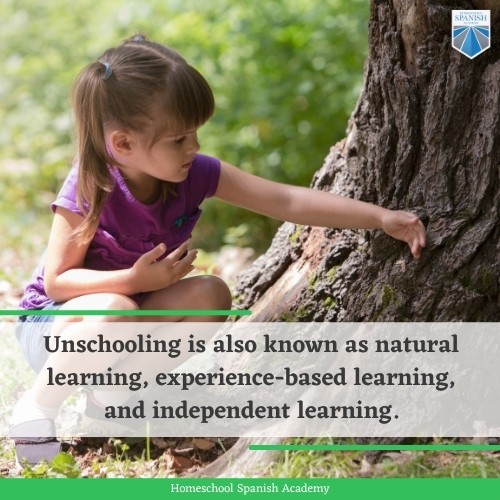
Unschoolers are lifelong learners who study fields and subjects based on their interests and obsessions. They learn how to learn independently by using resources and learning materials they find. Unschoolers are driven by curiosity and practical application rather than a pre-defined curriculum.
According to unschooling parent Leo Baubuta, “Learning is all around us, and it’s fun! That’s what unschooling teaches us.”
This is how I personally learn as a professional writer and editor, a yoga teacher, and a parent. It’s how our children will learn when they’re adults. Why not have them start learning in this way now?
What Unschooling Isn’t
Unschooling isn’t a method, it is a philosophy—a way of looking at children, learning, and life.
It isn’t dependent on educational institutions, curriculum publishers, or “experts.”
Unschooling isn’t one-size-fits-all, and it’s impossible to give unschooling directions for people to follow so that it can be tried out for a month to see if it works.
Unschooling does not mean that parents can never formally teach their children anything, nor that children will never take a course in any kind of a school.
Unschooling provides an opportunity to step away from educational systems and pedagogical methods and to instead develop independent ideas out of real-life experiences where the child is truly in pursuit of knowledge.
Unschooling vs Unlearning vs Deschooling
Unschooling is a radical approach to education based on learning through living rather than through the conventions of traditional school—or even a conventional homeschool.
Parents partner with their children rather than recreating school at home, as in more conventional styles of homeschooling. In short, children pursue their interests and curiosity with support and resources from parents.
Deschooling, on the other hand, refers to the transition process that children and parents go through when they leave the school system in order to start homeschooling (or unschooling). It is a gradual process through which children break free from their school routine and mentality and rediscover the ability to learn via self-determination and self-discipline.
Deschooling is a form of unlearning. Unlearning is the process of realizing that something which we learned previously is incorrect, ineffective, or obsolete. It involves becoming aware of this and consciously choosing to erase detrimental conditioning and misconceptions from our mind.
8 Tips for Unschooling Families to Learn Spanish
Are you contemplating using an unschooling paradigm to learn Spanish (or another world language)? Check out these 8 handy tips to inspire you!
1. Open your mind to a new way of learning.
According to Indian philosopher J. Krishnamurti, “Intelligence is the capacity to perceive the essential, the what is; and to awaken this capacity, in oneself and in others, is education.”
We all have different needs, interests, abilities, goals, strengths, weaknesses, and contexts as learners. Telling you how to unschool takes the freedom and fun out of it. Questions are everything, and finding the answers is the fun part.
At the same time, as a family interested in or new to unschooling, you’re no doubt looking for guidance. Hence the remaining points on this list!
2. Immersion is key.
It’s natural to learn a second language in the way you learned your first language. Language immersion is when you deeply involve a child in learning a second language by using it throughout the day.
Developing listening, speaking, reading, and writing skills in the target language is the key to immersion. Many experts believe that it’s one of the most effective ways to learn a new language.
3. Give your children bite-sized immersive experiences.
For young children and beginning Spanish learners, immersion needs to happen in small chunks. When they start to tune out or get frustrated, stop the immersive experience.
As their Spanish level improves, they’ll want to understand what’s going on in a Spanish story, conversation, or song. Over time, longer immersive experiences will become the norm.
4. Create a pleasant and engaging bilingual environment.
Being able to call things by their Spanish name is essential to immersion. Little by little, create Spanish labels for your furniture, school supplies, and household items. Encourage your child to start using these words, even if they mix them into their English sentences.
5. Listen to and watch Spanish.
Listening to Spanish podcasts or audiobooks and watching educational shows in Spanish is a superb way to access new vocabulary (including slang, in many cases), grammar, and conventions. It’s a much more engaging way of learning vocabulary and grammar than a textbook.
When you hear something you don’t understand, jot it down in your language journal. Looking it up to discover the meaning is a way of actively learning, as opposed to passively absorbing information.
6. Tomar notas.
Keeping a language journal is a fabulous way to support the learning process. Jot down any new words you hear in a conversation or in a movie, as well as those you come across when reading.
Note the definitions and pronunciation, and review your notes consistently. Carry a pocket-sized language journal along with you if you know you’re going to be in situations that require Spanish conversation.
7. Start unschooling Spanish with your child’s favorite interests.
You can find Spanish resources for just about any topic your child is interested in, such as anime, world history, arts and crafts, or the Harry Potter series.
For example, if your child loves music, try listening to various songs in Spanish until you find a few favorites. Print out the lyrics. If your child is able to read along with and copy the lyrics on a sheet of paper, that’s a fantastic natural extension of the activity.
8. Learn Spanish as a family.
Unschooling parents who don’t speak Spanish will ideally learn it along with their child. You’ll likely want to outsource foreign language lessons or start a foreign language curriculum at some point, but how you practice on your own as an unschooler is of equal importance.
Immerse Your Learner with Homeschool Spanish Academy
If Spanish immersion isn’t a realistic option for your family, consider signing up for Spanish classes with native speakers. Private classes will motivate you to speak Spanish right away and provide you with continual feedback on your pronunciation and grammar.
Investing in personalized lessons keeps you accountable. The teacher is there to help you with anything you have trouble understanding and create customized lessons to fit your specific goals. Want to try it out for yourself? Schedule a free trial class at Homeschool Spanish Academy today!
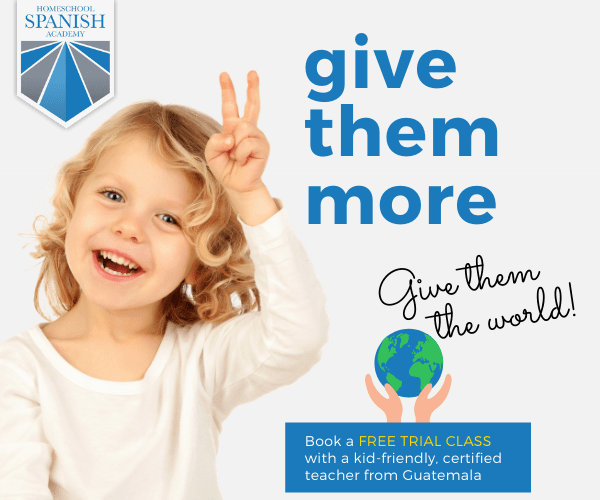
Want more free Spanish lessons, fun content, and easy learning strategies for kids? Check these out!
- Language Learning with Netflix: How to Use the Chrome Extension
- Turn Your Life Around: From Passive Bilingualism to Fluency!
- 10 Homeschooling Styles You Need to Explore in 2023
- Local Learning Networks: Finding Homeschool Co-ops Near You
- The Beauty of Spanish Sign Language
- Home Sweet Classroom: Creating Engaging Spanish Lessons at Home
- Multilingual Mastery: How Many Languages Can You Learn?
- The Journey of Becoming Trilingual
- 10 Innovative Contemporary Latin American Artists Who Broke the Mold - February 16, 2023
- The Sweetest Guide to Valentine’s Day Vocabulary in Spanish - February 14, 2023
- 10 Famous Afro-Latinas Who’ve Made a Powerful Impact - February 9, 2023



